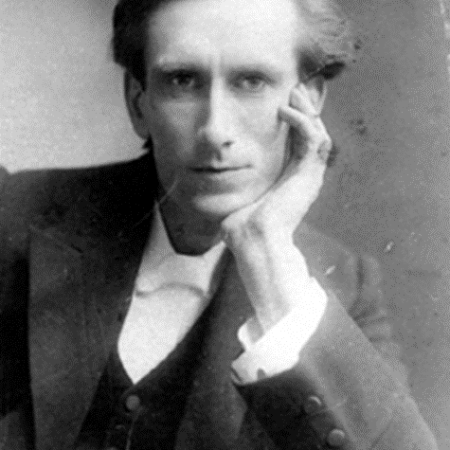Here’s this week’s inspirational delve into the past by Paul James-Griffiths of Christian Heritage Edinburgh

Image: Oswald Chambers (1874-1917), contemporary photograph, Public domain, via Wikimedia Commons
In faraway Cairo, a much-loved chaplain to the armed forces was laid to rest in 1917 with full military honours. Here soldiers, civilians and local people alike mourned the passing of a great Christian man. Oswald Chambers had left his role as a teacher at a Bible college in Clapham Common, London, to serve those who fought in the valley of death at Gallipoli. He had been based in the Y.M.C.A. (Young Men’s Christian Association) in Zeitoun and had ministered and cared for hundreds of soldiers who poured into the hut there, with many finding the Saviour. However, he died not of war wounds, but of appendicitis, preferring to give his hospital bed to injured soldiers.
Although Chambers’ mark was felt in the lives of thousands amongst the students he taught, and amongst those who heard the gospel from him during his preaching tours in Britain, Ireland, America and Japan, it is his books which have been the most powerful legacy of his short life. Among the thirty books that Oswald, the Scottish evangelist, had written, his most enduring is My Utmost for His Highest. This book of 365 daily devotionals has been one of the most popular Christian books ever written, with over 15 million copies being sold, in 39 languages. However, if it had not been for his wife Gertrude (“Biddy”) who compiled this work, the world may never have seen these deep and inspiring biblical messages. Countless people have been uplifted and encouraged, and have surrendered their lives to Christ through this volume.
Oswald Chambers was born in Aberdeen, Scotland, to Revd Clarence and Hannah Chambers. As he grew up in the Baptist Church, Oswald was proud of his Scottish roots, celebrating the courageous reformers and Covenanters. He was also nurtured by godly parents who had both been baptized by Charles Haddon Spurgeon, and who had been involved with the revival movement when D.L. Moody visited Britain. Oswald Chambers himself was converted to Christ through the preaching of Spurgeon when he lived in London. He then came under the sound of the inspirational preaching of the Revd J.T. Briscoe at Rye Lane Chapel in Peckham. Passionate as he was for Christ and his gospel, Oswald Chambers was just as passionate for art, and with great enthusiasm determined to become an artist, qualifying at the National Art Training School (later called the Royal College of Art). His work was certainly of a high quality, especially his portrait of the composer, Beethoven.
In 1895 he went to the University of Edinburgh. Living at 17 Livingstone St, he sallied forth to study art and archaeology. During this time, he felt an intense struggle within himself to surrender to Christ as Lord of all of his life. He wrote in his diary on 26 April 1896, “I am afraid I am too sordid and earthly for God to speak to and inspire; but I will wait for a heavenly vision in this matter.” He tells us that his time in Edinburgh was one of the most influential periods of his life, but he wrote to his friend George Oxer, “I shall never go into the ministry until God takes me by the scruff of the neck and throws me in.” During this inner conflict he decided to spend the night in prayer on Arthur’s Seat overlooking the city, to seek God’s will for his life, because all avenues for paid work in the arts had been blocked. It was here that God met him with the words, “I want you in My service – but I can do without you.”
During this time, he sensed a strong call to mission work. Hudson Taylor, the founder of the China Inland Mission, came to address the Christian Union at the university, after which Chambers wrote: “How can I dabble in art, pleasing my own artistic sense when that burdening cry of the human is ever rising, ‘What must I do to be saved?’ ‘Who will show us any good?’ How can I think of artistic comfort and high self-culture when the Voice of Jesus, the Spirit of Jesus constrains me to go and preach the gospel? Oh, it is not my worth, my ability, my talents, it is God that impels me.” And so, from 1897, we see Chambers studying at The Gospel Training College at Dunoon under Revd Duncan MacGregor, and being thrust into a life-long ministry which would lead him into the holiness Pentecostal movement, teaching at Bible colleges, and doing mission work abroad. But it would be his writing which would be his biggest legacy to the world.
“You who bring good tidings, lift up your voice with strength” (Isaiah 40:9, NKJV).
